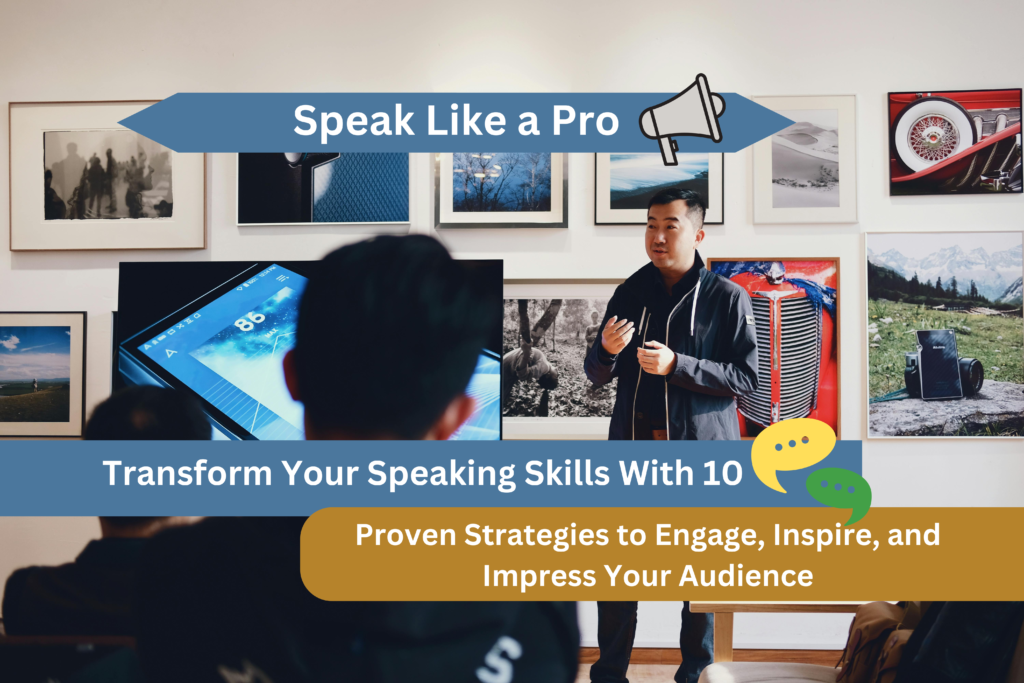Many of us want to be good speakers from childhood. Many speakers have such thoughts that the people in front listen to us attentively, that we can spread our thoughts among people. But if you want to learn how to be a good speaker, you have to keep some things in mind. What are those things?
Good speaking skills are essential for success in both personal and professional life. Public speaking is one of the most challenging skills we need in life.
Imagine being able to talk to anyone, anytime, and get your point across loud and clear. That’s the power of good speaking skills. It’s like having a secret weapon that can help you succeed in life
Table of Contents
My speaking started with debates and business competitions. I used to get really nervous, mumble, and feel anxious when I had to speak, especially in front of my college professors.
It’s natural to feel scared when you have to speak in front of others. Many people experience this.
However, I have followed some effective tips on how to be a good speaker.
Let’s explore these tips,

Gather 2x knowledge
Learning is important in giving a good speech. By learning more about your topic, no one can stop you in your conversation. The more you know about a topic, the better you can talk about it. Learning a lot will help you have interesting conversations
Why learn more?
Speak better: Increased knowledge can help you articulate your thoughts more effectively and persuasively.
Feel confident: A deeper understanding of speaking techniques can boost your self-esteem and reduce anxiety.
Speak clearly: Gathering additional knowledge can help you improve your pronunciation, enunciation, and overall clarity.
How to learn:
Practice often: The more you speak, the more confident you’ll become.
Ask for help: Seek feedback from friends, family, or mentors to identify areas for improvement.
Learn from others: Observe experienced speakers and analyze their techniques.
Try new things: Experiment with different speaking styles and approaches to find what works best for you.
So, learn 2x more thank you want to speak.By learning more in your topic no one can stop in in your conversation.
Start With Something Interesting and/or Engaging
In any presentation or in any public speaking most of people decide at the beginning, if they will hear you or not. in the first 1 minute, if you see that your audience is busy with their phones or talking with each other then you have to understand that they have lost interest in hearing your speech.
so then if you say anything engaging after that, they won’t show much interest in your topic.
so the first 30_40 seconds of your speech is very important. Start with a Storytelling that is similar to your topic that seeks the attention of the Audience.
For example, You’re on a calm boat ride, but out of nowhere, a storm hits. Without the right skills, you’re in trouble. In business, we face storms too, but with the right strategies, we can navigate through anything
Or start with a big number and a question.
For example, ‘There are more than 12 billion people in this world. No, that’s wrong. Do you know how many people are actually in this world?’ Alternatively, you can ask the audience a question that grabs their full attention. for example, ‘do you know the story of a lion and a rat?’By doing this, you’ll gain more confidence to continue with your speech.
Your job in the first minute should be to do something that binds the audience’s attention to your speech. Additionally, If people like you, they’re more likely to pay attention to your speech.

Smart Body Language
Body language is really important when you’re learning how to be a good speaker. First, it boosts your confidence—standing tall and making eye contact can make you feel more sure of yourself. Second, it helps you connect with your audience; showing enthusiasm through your gestures and expressions can make your listeners feel more engaged.
Lastly, body language helps reinforce your message. By using your body to emphasize your words, you can make your speech clearer and more memorable.
How to improve your body language:
- Stand tall: Good posture shows confidence and professionalism.
- Make eye contact: Connect with your audience by looking them in the eye.
- Use gestures: Hand gestures can help emphasize your points and make your speech more engaging.
- Smile: A friendly smile can make you more approachable and likable.
- Avoid nervous habits: Try to avoid fidgeting, pacing, or touching your face.
By paying attention to your body language, you can enhance your public speaking skills and deliver more impactful presentations.

Narrate AS a Story
You’ve done a lot of things from your school days to college life. How many of them do you remember? You might not recall many details, but you probably remember which friend of yours had a breakup in class 9. Sometimes, when you see that friend, you recall the story of his breakup.
The main point is that people can remember stories. Facts and figures don’t matter as much. Even if you include facts and figures in your speech or an important topic, if you present them as a story, people will understand and remember them more easily.
If you notice, you’ve read, memorized, and written many things for exams but can’t remember them well. However, you remember the stories of movies you’ve watched long ago.
Therefore, try to make your presentation a story that everyone finds interesting and can remember in the long term.
Interact with Audience
Audience interaction is a key part of how to be a good speaker. It changes a one-way talk into a lively, engaging conversation. By involving your audience, you make the experience more memorable, impactful, and enjoyable for everyone. Interact with those who are seeing or listening. you have to engage them by questioning. you have to interact with them by playing small mind games.
to interact with the audience do these, Ask Open-Ended Questions, tell a famous dialogue. sing a common and famous song, Tell Personal Stories, Use Humor, tell some jokes, and Offer Choices.
Be Careful of Tonality
If I become too excited or too happy, I’ll speak with that happiness, and people will see a charming smile on my face. But if I’m feeling sad, I won’t speak loudly; I’ll be calm, take more pauses, and keep silent.
Showing our emotions through tonality—whether it’s sadness, happiness, or excitement—is very important. If you speak like a robot throughout your entire speech, there will be no variation in your tone, and it will seem as if you’re ‘dead’ in your speech.
So don’t be a ‘dead’ presenter. Your happiness should be reflected in your smile while you speak. Your sadness should be conveyed through pauses in your speech. Your excitement should be visible in your face and tonality.
Never speak in a flat monotone; your tonality should have ups and downs to keep things interesting
Make it relatable for the audience
You have to consider the age of the audience, their educational background, and their life experiences to relate your speech effectively.
For example, if you use complex terms from quantum mechanics for a 5th grader, no matter how good your speech is, it won’t capture their attention because they won’t understand your context. As a result, your speech will fail. Now, imagine if you were talking about something they could relate to, like a favorite video game or a fun science experiment. They’d be engaged, asking questions, and excited to learn more.
Tailoring your speech to match the age, educational level, and life experiences of your audience ensures they stay engaged and fully understand your message. This approach is essential if you want to learn how to be a good speaker.
Talk with Expressions
Expressive speaking is essential for effective communication. It involves using your voice, body language, and facial expressions to convey your message clearly and engagingly. When you speak expressively, you not only communicate information but also connect with your audience on a deeper level.
When you speak, it’s not just your mouth that communicates; your eyes, teeth, and cheeks also play a role. For example, blinking, smiling, and moving your head are all forms of expression.
Comedians, for instance, use a lot of expressions when they perform. They don’t always need to say much in their punchlines; their expressions do a lot of the work.
So, expressions are very important. Speaking continuously without any expressions can be boring and monotonous. You might find yourself eagerly watching a 20-minute entertainment video but struggle to stay engaged with a 2-minute speech from a teacher if their face remains static and only their mouth moves.
Don’t be expressionless. You’ll know how to be a good speaker if you incorporate expressions into your speech.
Listen a lot
A good speaker is also a good listener. A good speaker regularly reads and watches the news, TED Talks, podcasts, comedy shows by talented comedians, and articles. They watch live events or learn from the internet. This helps a speaker gain knowledge and deliver an informative speech. Remember, if a speech is not good, people will not appreciate it.
A good speaker also tries to follow the effective techniques of other skilled speakers and incorporates these strategies into their own style.
Have a Proper Attire
Dressing sense is really important. If you’re going to a big function, choose your dress accordingly. Different countries require different clothing choices. If you’re attending a cultural function, your dress should match the theme.
Also, dress varies even within the same country depending on the event. If you have a corporate function, wear a suit. You need to know when to be formal and when to be casual.
Remember, it’s better to be overdressed than underdressed in any situation. For example, if you’re unsure whether people will wear suits at a function, it’s safer to wear a suit. If you see others wearing suits and you’re not, you might feel inferior.
When I went to my university interview, I noticed that everyone was wearing suits and ties, but I was in casual dress. I lost my confidence, and my interview didn’t go as well as I had hoped.
If the opposite happens, and you’re wearing a suit while others are not, you might feel overdressed. However, this won’t affect your confidence as much. In some cases, being overdressed is fine, but being underdressed can be a problem.
Therefore, be mindful when choosing your outfit. Some people judge you by your clothes before they listen to you. Unfortunately, people often judge a book by its cover, so make sure you have the proper attire. Knowing how to be a good speaker also ties into this, as your appearance can influence how your message is received.



